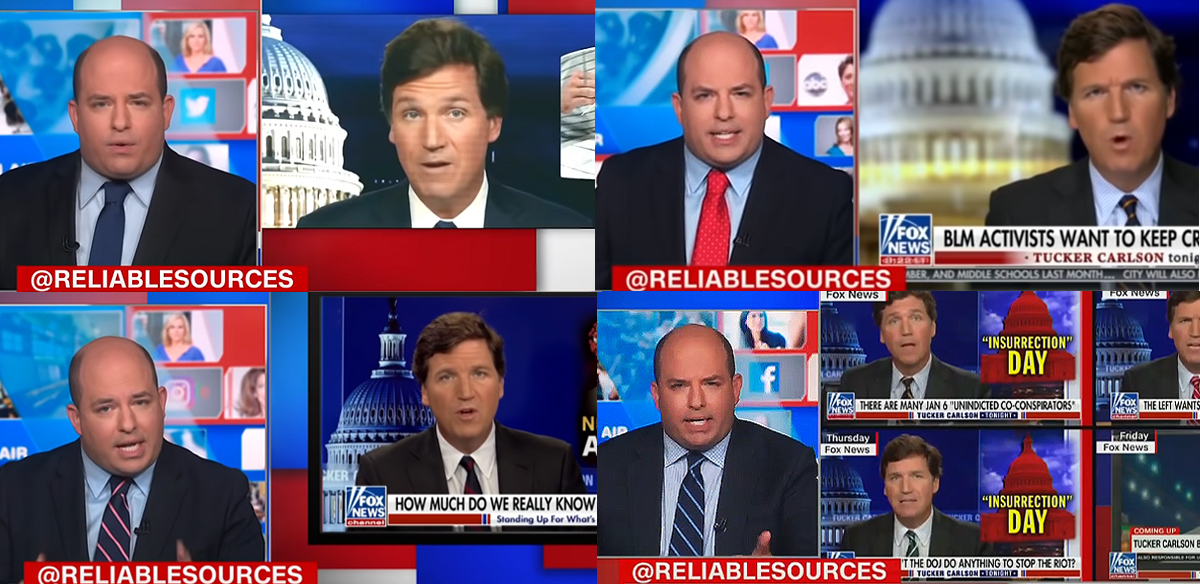Did Brian Stelter’s Publisher ‘Out’ Tucker Carlson As a Source for CNN Host’s Book on Fox News?

When New York Times media columnist Ben Smith published an article on Sunday essentially “outing” Fox News star Tucker Carlson as a widely used source for journalists all over D.C. and elsewhere, it was the talk of media Twitter and the subject of blog posts and follow-on news alike.
Obviously the idea that the guy the press loves to hate, and who loves to hate the press, is also a chummy texting buddy with half the hated mainstream media is a juicy one.
Part of that Smith story was about CNN’s media correspondent Brian Stelter, and his new book HOAX, which is about Fox News and talks plenty about Carlson, with whom Stelter shares a very public hate-hate relationship.
Or does he? Could it be that Tucker Carlson was actually a source for HOAX? He didn’t give an on the record interview to Stelter, but there’s evidence they had chats on background.
The Washington Post’s Erik Wemple presented some of that evidence in his own column a couple of days later a deleted tweet from HOAX’S publisher.
There is no archive of the tweet that we could find, so swiftly it was taken down by HOAX publisher One Signal. Wemple has a screenshot you can see in his article, the above image being just a taste. But here’s what it says:
Nice to see HOAX mentioned in @benyt’s piece about Tucker Carlson’s relationship with the press. @brianstelter interviewed him for the hardover of HOAX, and he remains a central figure in the new paperback material on the election and @FoxNews’s future.
That was a comment on and retweet of the New York Times article from Smith, and the mention of Stelter it references is this one:
And Brian Stelter, the host of the CNN program “Reliable Sources,” told me that “you can see Tucker’s fingerprints all over the hardcover” edition of his 2020 book “Hoax,” which excoriates Fox News for amplifying Mr. Trump’s falsehoods. He said that he “couldn’t stomach” talking to Mr. Carlson, who has grown ever more hard-line, for the updated paperback version that was just released.
Both the tweet and the passage leave room for interpretation, but so does the word “interview” in general.
And speaking of interviews, Wemple points out that when he interviewed Stelter last year, the CNN host told him Fox did not “cooperate” with the book, although he was in frequent contact with the company about it. But that wouldn’t really have any bearing on a secret source relationship.
“There are a couple of indications, however, that Stelter secured access to Carlson’s innermost thoughts for ‘Hoax,'” writes Wemple.
In a discussion of Sean Hannity’s 2017 embrace of the Seth Rich conspiracy theory, for instance, ‘Hoax’ notes that other shows on Fox News took a pass. “‘I’m not covering that,’ Tucker remarked to a friend,” wrote Stelter, “‘because I’m not crazy.’ Let that sink in — a conspiracy too ‘crazy’ for Tucker.” The same motif pops up when “Hoax” credits Carlson for shaping Trump’s views on Iran in a phone call. “‘He’s conflicted,’ Tucker told a pal. ‘All I can do is remind him of what he thinks,’” Stelter wrote.
Wemple goes on to cover more background on the idea of Carlson as not just an interviewee but a source. He allows that it isn’t necessarily the case, that “fingerprints” could be “a vague reference to Carlson’s diffuse influence” on the book. It’s clear that he doesn’t think that the most likely interpretation, and in his conclusion he returns to the question at hand, and with not a little condemnation.
“In March 2019, Carlson called Stelter a ‘eunuch’ on Tucker Carlson Tonight. He also sent a dozen jelly Dunkin’ donuts to the CNN host, a puerile ploy that Stelter interpreted in ‘Hoax’ as a ‘fat-shaming attempt,'” Wemple recounts. He concludes that the whole thing reveals Carlson’s show to be “a sham dedicated to hoodwinking its most dedicated viewers.”
His take is slightly different from that of Steve Krakauer, writing about the whole shebang in his Fourth Watch newsletter on Wednesday night. He mentions, as some in the business of media about media have in the last few days, that the seeming normalization of burning sources publicly in this way is not a good development, and suggests that the standard employed in choosing who to burn is a function of political bias.
But he also remarks on just who it is that looks bad specifically in the Carlson-Stelter tête-à-têtes.
“Tucker makes fun of Stelter publicly – engaging with him privately doesn’t make the public treatment hypocritical,” says Krakauer. “Stelter portrays Tucker as a dangerous liar publicly – but apparently he’s privately chatting him up as a trusty source.”
It’s a sentiment he put in even briefer form by reply to Wemple on Twitter: “Stelter portrays Tucker as a dangerous liar publicly – the ‘sham’ is if he’s privately chatting him up as a trusty source.”
A few hours ago, Stelter gave a book interview to MSNBC anchor and Washington Post editorial board member Jonathan Capehart. The Washington Post is where Erik Wemple writes and where his editorial here quoted was published, as a reminder. Capehart did not ask about the degree of cooperation given by Carlson, or whether he was a source for the hardcover or paperback versions of “HOAX”, but he did ask about sources in general. And he did ask about Tucker Carlson specifically.
As both Wemple and Krakauer were describing, and as Mediaite readers well know, Stelter’s comment about Carlson are usually, and were today … unflattering. For one thing, he and Capehart painted Carlson as a purveyor of lies and untruths and disinformation. He also described the Fox host as “radicalized.” The two further agreed that these characteristics make Carlson dangerous. That characterization is commonplace in the media.
On Sunday, Ben Smith wrote that Tucker Carlson is a source for the press despite their mutually antagonistic relationship, and on Tuesday, Erik Wemple names Brian Stelter and his book about Fox as a singularly exceptional example of the dynamic, with the publisher of the book as an accidental source.
Anonymous sources, mutual sources, texts and phone calls and friendships and backstabbing. Twitter and email and LinkedIn and gossip and parties and Telegram and Signal and book signings and … I don’t know, fantasy sports? You get the picture. Part of it anyway.
Is it the tip of the iceberg on a media deep state, or just a guy with a bowtie and a chatty personality? I don’t know. But maybe a source will fill us in. Through a backchannel of course. I may not be the hippest cat, but I’ve got a Facebook. Is that anything?







